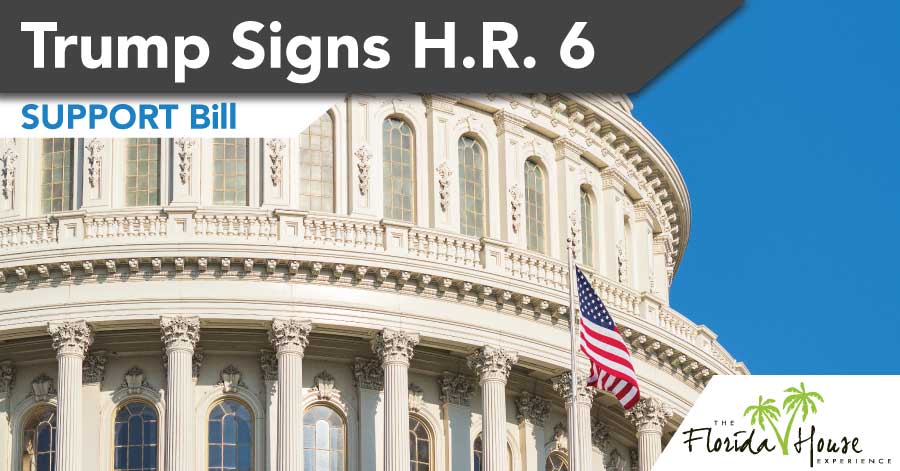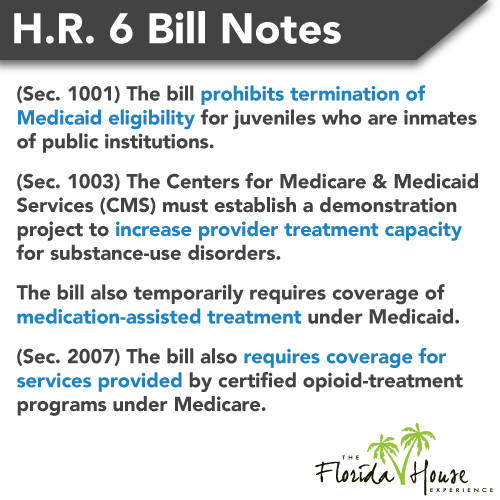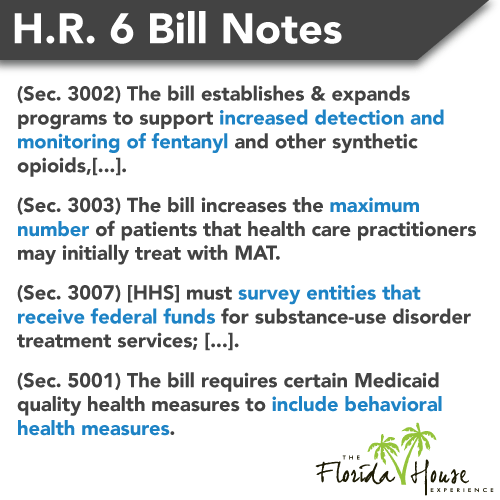
In October 2018, President Trump signed a key bipartisan bill that activates several crucial measures aimed at treating addiction, especially addiction to opioid medications. The bill works with Medicaid and Medicare insurers to standardize triage and treatment for those suffering from addiction, and giving the treatment community the ability to offer patients effective, affordable treatment.
The bill is a step towards achieving the goals of treatment centers like FHE Health. We hope that lawmakers will continue to make it easier to offer our addiction treatment and support services to a larger community of people in South Florida and beyond.
Read about some of the provisions that the H.R. 6 Support for Patients and Communities bill puts into place, and how they align with the mission of the FHE.
Highlights of the Bill
 This landmark opioid treatment bill contains a long list of provisions. Here are some of the highlights:
This landmark opioid treatment bill contains a long list of provisions. Here are some of the highlights:
Expanding Access to Treatment
First, the bill expands the ability for Medicaid recipients to receive treatment with language allowing addicts to keep their coverage in certain cases, as well as expanding access to treatment locations for this population. This is a key provision in H.R. 6, as previously, Medicaid recipients in certain areas had difficulty finding adequate treatment.
The bill makes it easier for people with Medicaid and Medicare to receive holistic care, using new, evidence-based treatment for addiction and substance use disorders (SUDs). This includes language aimed at high-risk youth populations, for example, the bill prohibits state Medicaid program from terminating a juvenile’s medical assistance because the juvenile is incarcerated. This makes it easier for juveniles to receive an intervention before they enter the cycle of addiction.
Standardizing Levels of Care
The definition of “levels of care” have long been used by treatment facilities to help show prospective patients the services they can offer along the continuum of care. The lack of an industry-standard has hurt the ability of patients to find treatment at the optimal care level.
H.R. 6 puts in place a pilot program for standardization and verification of different levels of care, in hopes that it will make it easier for addicts to find the treatment that’s right for them, increasing the effectiveness of treatment as well of the efficiency of the money spent by insurers in the industry.
Optimizing Prescribing Practices
 Three times as many opioid prescriptions were being written in 2016 compared to 1999, fueling the current opioid epidemic, according to the CDC. While previous legislation limited prescribing behavior by physicians, H.R. 6 further enacts regulations to control the ability to access the drugs, especially in populations with high addiction risk.
Three times as many opioid prescriptions were being written in 2016 compared to 1999, fueling the current opioid epidemic, according to the CDC. While previous legislation limited prescribing behavior by physicians, H.R. 6 further enacts regulations to control the ability to access the drugs, especially in populations with high addiction risk.
The bill tasks Medicaid and Medicare programs with finding non-opioid alternatives to common pain medications, as well as calling on the U.S. Food and Drug Administration to authorize more non-addictive ways to treat pain.
H.R. 6 has also taken steps to better regulate the prescription of life-saving drugs when needed, allowing medical practices to prescribe addiction treatment drugs like buprenorphine more easily and to a larger number of patients at a time. Buprenorphine is a partial opioid agonist and is one of the key components of established treatment drugs like Suboxone.
H.R. 6 Support Bill is a Positive Step
While the Support bill signed by President Trump won’t be able to give everyone struggling with addiction the access to care that they need on day one, the reactions from the treatment community are positive and hopeful that this bill can create new opportunities to treat addiction effectively.
Learn more about the mission of the Florida House experience by reading more about us.






